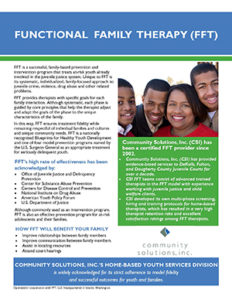Youth Services: Functional Family Therapy (FFT)
Prioritizing the Treatment of Families
FFT is an evidence-based, BluePrint Plus, family-based prevention and intervention program that treats at-risk youth and youth already involved in the juvenile justice system. Unique to FFT is its systematic, individualized, family-focused approach to juvenile crime, violence, drug abuse and other related problems.
FFT may include diversion, probation, alternatives to incarceration, and or re-entry programs for youth returning to the community following release from a high-security, severely restrictive institutional or residential setting. FFT is also used to serve adolescents within the child welfare system and school settings.
What is Functional Family Therapy?
Evidence-Based
Empirically grounded, well-documented and highly successful family intervention program for dysfunctional youth.
At-Risk Youth
Applied to a wide range of at-risk youth aged 11-18 and their families, including your with problems such as conduct disorder, violent acting-out, and substance abuse.
Intervention
Ranges from, on average, 8 to 12 one-hour sessions up to 30 sessions of direct service for more difficult situations.
Flexible Setting
Conducted both in clinic settings as an outpatient service and as a home-based model.
Treatment
A treatment technique that is appealing because of its clear identification of specific phases, which organizes intervention in a coherent manner, thereby allowing clinicians to maintain focus in the context of considerable family and individual disruption.
Progression
Each phase includes specific goals, assessment foci, specific techniques of intervention, and therapist skills necessary for success.
FFT Intervention Phases
Engagement
Designed to emphasize factors that protect youth and families from early program dropout.
Motivation
Designed to change maladaptive emotional reactions and beliefs, and increase alliance, trust, hope, and motivation for lasting change.
Assessment
Designed to clarify individual, family system, and larger system relationships, especially the interpersonal functions of behavior and how they related to change techniques.
Behavior Change
Consists of communication training, specific tasks and technical aids, basic parenting skills, contracting and response-cost techniques.
Generalization
Family case management is guided by individualized family functional needs, their interface with environmental constraints and resources, and the alliance with the FFT therapist/family case manager.

